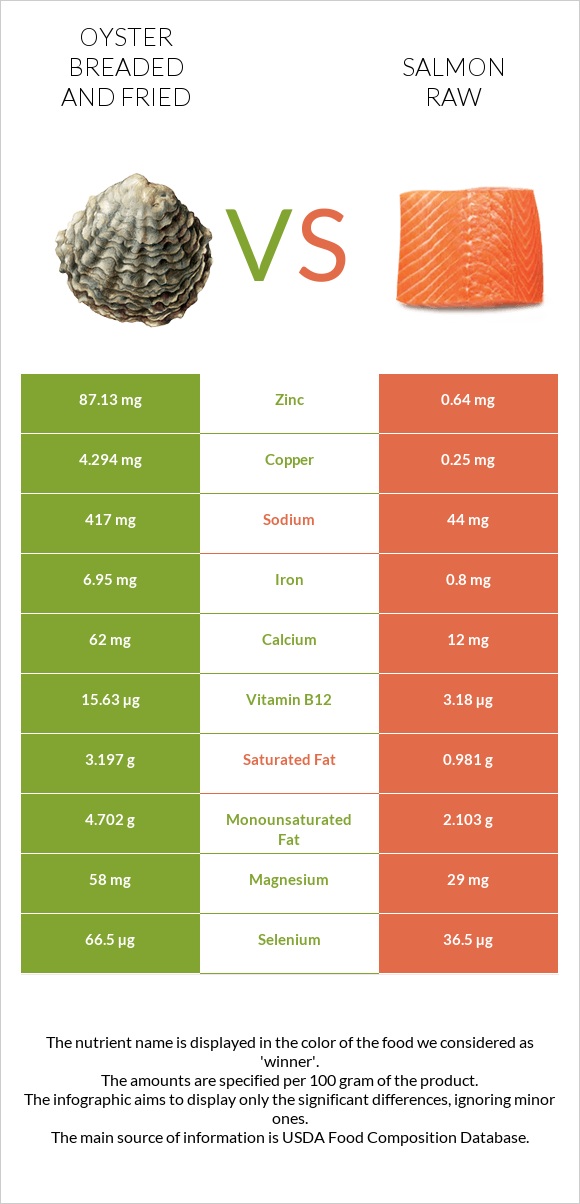Oyster breaded and fried vs. Salmon raw — In-Depth Nutrition Comparison
Compare
The main differences between oyster breaded and fried and salmon raw
- Oyster breaded and fried is richer in zinc, vitamin B12, copper, iron, selenium, and manganese, yet salmon raw is richer in vitamin B6, vitamin B3, and vitamin B5.
- Daily need coverage for zinc for oyster breaded and fried is 786% higher.
- Oyster breaded and fried contains 31 times more manganese than salmon raw. Oyster breaded and fried contains 0.49mg of manganese, while salmon raw contains 0.016mg.
- Salmon raw contains less sodium.
Food types used in this article are Mollusks, oyster, eastern, cooked, breaded, and fried and Fish, salmon, Atlantic, wild, raw.
Infographic

Infographic link
Mineral Comparison
Mineral comparison score is based on the number of minerals by which one or the other food is richer. The "coverage" charts below show how much of the daily needs can be covered by 300 grams of the food.
| Contains more MagnesiumMagnesium | +100% |
| Contains more CalciumCalcium | +416.7% |
| Contains more IronIron | +768.8% |
| Contains more CopperCopper | +1617.6% |
| Contains more ZincZinc | +13514.1% |
| Contains more ManganeseManganese | +2962.5% |
| Contains more SeleniumSelenium | +82.2% |
| Contains more PotassiumPotassium | +100.8% |
| Contains more PhosphorusPhosphorus | +25.8% |
| Contains less SodiumSodium | -89.4% |
Vitamin Comparison
Vitamin comparison score is based on the number of vitamins by which one or the other food is richer. The "coverage" charts below show how much of the daily needs can be covered by 300 grams of the food.
| Contains more Vitamin CVitamin C | +∞% |
| Contains more Vitamin AVitamin A | +650% |
| Contains more Vitamin B12Vitamin B12 | +391.5% |
| Contains more FolateFolate | +24% |
| Contains more Vitamin B1Vitamin B1 | +50.7% |
| Contains more Vitamin B2Vitamin B2 | +88.1% |
| Contains more Vitamin B3Vitamin B3 | +376.4% |
| Contains more Vitamin B5Vitamin B5 | +516.3% |
| Contains more Vitamin B6Vitamin B6 | +1178.1% |
All nutrients comparison - raw data values
| Nutrient |  |
 |
DV% diff. |
| Zinc | 87.13mg | 0.64mg | 786% |
| Vitamin B12 | 15.63µg | 3.18µg | 519% |
| Copper | 4.294mg | 0.25mg | 449% |
| Iron | 6.95mg | 0.8mg | 77% |
| Vitamin B6 | 0.064mg | 0.818mg | 58% |
| Selenium | 66.5µg | 36.5µg | 55% |
| Vitamin B3 | 1.65mg | 7.86mg | 39% |
| Vitamin B5 | 0.27mg | 1.664mg | 28% |
| Protein | 8.77g | 19.84g | 22% |
| Manganese | 0.49mg | 0.016mg | 21% |
| Sodium | 417mg | 44mg | 16% |
| Vitamin B2 | 0.202mg | 0.38mg | 14% |
| Fats | 12.58g | 6.34g | 10% |
| Saturated fat | 3.197g | 0.981g | 10% |
| Vitamin A | 90µg | 12µg | 9% |
| Magnesium | 58mg | 29mg | 7% |
| Potassium | 244mg | 490mg | 7% |
| Phosphorus | 159mg | 200mg | 6% |
| Vitamin B1 | 0.15mg | 0.226mg | 6% |
| Monounsaturated fat | 4.702g | 2.103g | 6% |
| Cholesterol | 71mg | 55mg | 5% |
| Calcium | 62mg | 12mg | 5% |
| Polyunsaturated fat | 3.313g | 2.539g | 5% |
| Vitamin C | 3.8mg | 0mg | 4% |
| Carbs | 11.62g | 0g | 4% |
| Calories | 199kcal | 142kcal | 3% |
| Folate | 31µg | 25µg | 2% |
| Net carbs | 11.62g | 0g | N/A |
| Tryptophan | 0.105mg | 0.222mg | 0% |
| Threonine | 0.365mg | 0.87mg | 0% |
| Isoleucine | 0.396mg | 0.914mg | 0% |
| Leucine | 0.638mg | 1.613mg | 0% |
| Lysine | 0.582mg | 1.822mg | 0% |
| Methionine | 0.199mg | 0.587mg | 0% |
| Phenylalanine | 0.352mg | 0.775mg | 0% |
| Valine | 0.409mg | 1.022mg | 0% |
| Histidine | 0.175mg | 0.584mg | 0% |
| Omega-3 - EPA | 0.202g | 0.321g | N/A |
| Omega-3 - DHA | 0.218g | 1.115g | N/A |
| Omega-3 - DPA | 0.048g | 0.287g | N/A |
Macronutrient Comparison
Macronutrient breakdown side-by-side comparison
Protein:
8.77 g
Fats:
12.58 g
Carbs:
11.62 g
Water:
64.72 g
Other:
2.31 g
Protein:
19.84 g
Fats:
6.34 g
Carbs:
0 g
Water:
68.5 g
Other:
5.32 g
| Contains more FatsFats | +98.4% |
| Contains more CarbsCarbs | +∞% |
| Contains more ProteinProtein | +126.2% |
| Contains more OtherOther | +130.3% |
~equal in
Water
~68.5g
Fat Type Comparison
Fat type breakdown side-by-side comparison
Saturated fat:
Sat. Fat
3.197 g
Monounsaturated fat:
Mono. Fat
4.702 g
Polyunsaturated fat:
Poly. Fat
3.313 g
Saturated fat:
Sat. Fat
0.981 g
Monounsaturated fat:
Mono. Fat
2.103 g
Polyunsaturated fat:
Poly. Fat
2.539 g
| Contains more Mono. FatMonounsaturated fat | +123.6% |
| Contains more Poly. FatPolyunsaturated fat | +30.5% |
| Contains less Sat. FatSaturated fat | -69.3% |